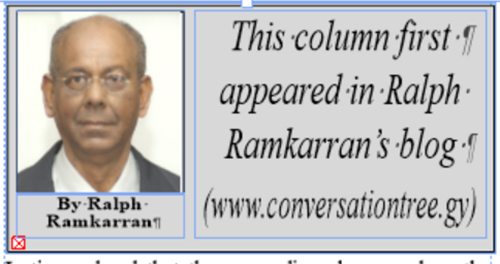On Wednesday last the public was treated to a brilliant and expansive lecture by the former Chancellor (ag) of the Judiciary and now Distinguished Jurist-in-Residence at the University of Guyana, Carl Singh. The subject was ‘The Constitutional Guarantee of Fundamental Rights and the Citizen’. The lecture, to a packed hall and attentive audience at Herdmanston House, was the third in the series ‘Conversation on Law and Society.’ Chancellor Singh started by pointing out that while citizens may not always be cognizant of what their rights are, they are certainly aware of what the Constitution guarantees them, which they are often prepared to aggressively defend. He related the story of a visitor to a hospital in Georgetown who was being prevented from entering because the visiting hours had come to an end. During the argument between the visitor and the hospital staff, the visitor loudly proclaimed that it was her constitutional right to enter the hospital to visit her relative!
Chancellor Singh explored a wide range of issues, not all of which can be examined here. A few are selected.
The right to life, which is protected in our Constitution, was explored at length by Chancellor Singh. In Guyana, there are no cases exploring the constitutional right to life, and the meaning of ‘life.’ There was no reason to think that ‘life’ would mean anything more. But in India, Chancellor Singh pointed out, the right to life has been given a wide compass to include not only the right to a livelihood but also the right to live in slums and on pavements near to places of employment. Chancellor Singh expressed the view that the development of Indian jurisprudence, at least in this regard, depends on Indian socio-economic conditions. He was in effect saying an expanded definition of ‘life’ took account of the depth of poverty in that country and that such an approach might not be wholly relevant elsewhere. This view raises profound and fundamental questions as to the constitutional meaning of ‘life.’ Does ‘life’ have one meaning for the entire humanity or does the meaning depend on the state of socio-economic development in the country? This is not an issue that can be resolved here.
Freedom of expression is a topical issue and it has always been a matter of controversy in Guyana. The dismissal of Dr David Hinds and Mr Lincoln Lewis as columnists of the government-owned Chronicle framed the discourse on this topic. Chancellor Singh shone light on the almost forgotten decision of the late then Justice Aubrey Bishop who ruled in the case of Makepeace Richmond v Guyana National Newspapers Limited, the publishers of the government owned Chronicle, that the latter violated the constitutional right to freedom of expression by refusing to publish an advertisement by the Liberator Party for a public meeting. For members of the Judiciary who fear consequences in matters like these, they should remember that Aubrey Bishop went on to become a Court of Appeal Judge and Chancellor.
Chancellor Singh reminded the audience of the Hope v New Guyana Ltd case in which the Court of Appeal upheld the ‘direct impact’ test of subsidiary legislation on freedom of expression as opposed to the ‘pith and substance’ test. An order was made requiring a licence to import newsprint. The result was that the Mirror newspaper, which represented the views of the opposition PPP, and published by the New Guyana Co Ltd, was denied a licence to import newsprint. The result was that the Mirror newspaper was printed on borrowed newsprint and shrunk to a broadsheet published part of the week. The New Guyana Ltd challenged the constitutionality of the order. The High Court ruled in favour of New Guyana. The Court of Appeal overturned the High Court’s decision and held that since the orders did not have a ‘direct impact’ on freedom of expression, it was lawful. The ‘pith and substance’ test, (the true nature and impact of the order) was rejected. This interpretation gained credibility by the government’s refusal to grant a licence to import newsprint given as a gift by the Jamaican Gleaner. Criticised by Sir Fred Phillips, a Caribbean constitutional law scholar, this decision of 1979 justified and perpetuated the destruction of press freedom in Guyana.
The Chancellor referred to attacks which were made on the judiciary in the past by ruling authorities, tending to undermine the independence of the judiciary. At the same time, he pointed to the studied diminishing of the independence of the judiciary by the judiciary itself when Chancellor Crane announced that the courts should be guided by the executive’s policy of socialism.
The judiciary at this time is different from the judiciary in the 1970s and 1980s. And it is functioning in different conditions. Despite these differences, judiciaries in small, developing, countries usually find it very difficult to sustain their independence. But for the Caribbean region, it is only in Guyana that the judiciary was left behind. The judiciaries of Jamaica, Trinidad and Barbados did not face the same challenges as in Guyana and were able to maintain a sturdy independence. The best we can do is to continue to strongly support and defend our judiciary, giving our judges strength to develop and sustain their independence.

